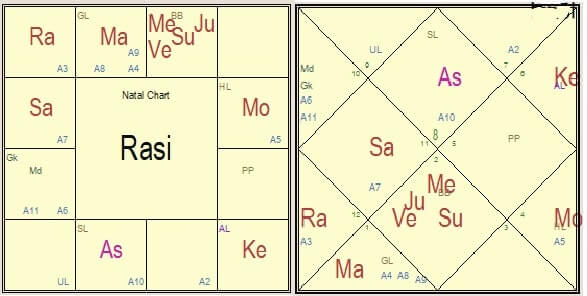Narendra Modi, a widely popular leader in India, has been elected as Prime Minister for a record third term. He was sworn in by the President on June 9th at 7:15 PM. Earlier, the Bharatiya Janata Party (BJP), under Modi's leadership, emerged as the single largest party with 240 seats, while the BJP-led NDA alliance secured a total of 293 seats.

Prime Minister Narendra Modi and the BJP government were sworn in during a Scorpio Ascendant (Lagna), with the ascendant degree at 26 degrees. The ascendant lord, Mars, is positioned in the 6th house in Aries, its own sign. Additionally, Saturn, also in its own sign, aspects both Mars and the 6th house. The 7th house hosts four planets: Sun, Mercury, Venus, and Jupiter, while the Moon is placed in the 9th house, its own sign.
Also Read: Narendra Modi Horoscope
Muhurta Analysis
First, let's analyze whether the chosen muhurta for the oath ceremony is favorable. Since the Prime Minister is the head of the government, we will evaluate the muhurta timing with reference to his personal birth chart.
| Aspect | Description |
|---|---|
| Tara Bala | Parama Maitra - Very Favourable |
| Chandra Bala | Favourable |
| Panchaka | Agni Panchaka - Mixed Results |
| Guru Bala | Positive |
| Nakshatra | Punarvasu (Jupiter) - Favourable |
| Week Day | Sunday (Sun) - Very Favourable |
| Tithi | Chaturthi - Good |
| Yoga | Dhruva - Favourable |
| Karana | Vanija - Favourable |
| Numerology Number | 9 (Mars) - Favourable |
Additionally, it is a Godhuli muhurta, considered highly auspicious and believed to ward off many negative influences from the chart. Overall, the muhurat timing is favorable for the swearing-in ceremony of Prime Minister Narendra Modi. Read More here - Simple Way of Calculating Muhurta
Ascendant - Scorpio
Scorpio, a fixed water sign ruled by Mars, is associated with intensity, transformation, and depth. This alignment signifies a profound drive to achieve objectives, even amidst significant challenges. The country may experience substantial changes, demonstrating an ability to emerge from crises stronger than before. Strategies and plans are likely to be kept secret, only revealed when necessary.
The ascendant lord, Mars, is positioned in Aries, the 6th house (an Upachaya house), and also aspects the ascendant. This suggests a period characterized by strong, decisive leadership with a focus on service, health, and national security. Mars as the ascendant lord indicates determination and a proactive approach, marked by action-orientation and a vigorous pursuit of goals. Mars in its own sign of Aries amplifies its qualities of leadership, decisiveness, and readiness for direct confrontation, indicating a robust emphasis on national security and defense policies. There may be some erratic decisions initially. The 6th house deals with service, public health, and challenges such as enemies and debts. Mars' placement here highlights a strong focus on improving public services, healthcare, and tackling obstacles head-on. This combination also suggests that enemies, both internal and external, will keep the government vigilant, facing numerous challenges on both fronts.
Planetary aspect on Ascendant
The Ascendant lord, Mars in the 6th house (its own sign of Aries) and aspects the ascendant. Additionally, four planets—Sun, Jupiter, Mercury, and Venus—reside in the 7th house (Taurus), all aspecting the ascendant. Saturn is located in the 4th house (Aquarius) and casts its aspect on the ascendant as well.
In this combination, all the planets except the 9th lord Moon are aspecting the ascendant, creating a dynamic interaction of planetary influences. The multiple aspects on the ascendant significantly impact the nation's identity, public image, and overall direction. The aspects of Mars, Saturn, and the Sun on the ascendant make the approach very adamant, rigid, and goal-oriented.
The Sun in the 7th house as the 10th lord of power aspecting ascendant indicates a strong, authoritative presence in international relations and partnerships, with the government likely to project confidence and authority. The strong aspect of Jupiter (2nd and 5th lord) enhances the nation's image and promises opportunities for expansion and development in foreign relations, trade, and diplomacy. Mercury in the 7th house as the 8th and 11th lord aspecting asc indicates effective communication and diplomatic skills, enabling the nation to excel in negotiations and international trade. Venus' aspect, as the 7th and 12th lord, suggests a focus on creating harmonious international partnerships and fostering cultural and economic ties. However, Venus' influence is considerably reduced due to its close proximity to the Sun and its position at the farthest point from the Earth.
Saturn, positioned in the 4th house, aspects the Ascendant, ascendant lord Mars, 10th house and the 6th house. The 4th house governs domestic affairs, the general public, and agriculture, bringing discipline, structure, and realism to these areas. This indicates that while the government will be assertive, it will also operate with a sense of responsibility, long-term planning, and caution. Significant efforts may be made to improve public infrastructure and housing. Saturn’s influence can also introduce delays, challenges, and a sense of heaviness. The government is likely to face significant obstacles and responsibilities, necessitating perseverance and strategic management to overcome them.
Kendra and Trikona Houses
The Kendra lords—Mars, Saturn, Venus, and the Sun—are strongly placed and all aspect the ascendant, indicating a leadership with a balanced approach to both domestic and international matters. The Sun and Mars contribute to a confident and proactive leadership style, while Saturn and Venus bring structure and harmony. This suggests that the government will continue its hard work and determination but will adopt a more people-centric approach this time.
Trinal houses generally indicate past karmic actions, luck, and prosperity. In this case, Jupiter (5th lord) and Moon (9th lord) are well-placed. The Moon in the 9th house is in its own house in both the D1 and D9 (Vargottama) charts, aspected by the ascendant lord, which would typically be an excellent position for a government. However, there is a caveat. In the Bhava Kundali chart of Vedic Astrology, all these planets shift one house to the left. Therefore, the Moon moves to the 8th house and Jupiter to the 6th house, maintaining their signs. While their positive effects may be somewhat reduced, they still promise good results.
Some concerns
Looking at the chart, there is a concentration of seven planets within the 4th and 7th houses, along with a cluster of malefic energy in the 4th, 5th, and 6th houses without benefic aspects. This configuration is not ideal for any chart, suggesting potential challenges in governance. Prime Minister Modi may encounter internal resistance and will need to exert considerable effort in managing this coalition government. Criticism from the general public may also be expected. Additionally, there could be heightened tensions, potentially leading to a war-like situation or incidents of terrorism during this period.
Furthermore, all the planets, except Saturn, are positioned within the Rahu-Ketu axis, including the ascendant lord. This alignment may weaken their positions further. However, the sign lords of Rahu (Jupiter) and Ketu (Mercury) are strongly placed in the Navamsa Chart (D9 chart), significantly mitigating the potential negative effects.
Can Narendra Modi Manage a Coalition Government?
The pressing question remains: Can Narendra Modi effectively steer a coalition government? The astrological indicators suggest both challenges and potential strengths in the chart. Managing a coalition is akin to running a partnership business. The 7th house, crucial for partnerships, hosts four planets, yet its lord Venus appears relatively weaker. Complicating matters, the 10th lord Sun resides in the 7th house, implying Modi may need to accommodate the demands of his coalition partners. Mercury and Venus, lords of both benefic and malefic houses (8th and 12th house respectively), pose potential challenges for governance. However, Jupiter emerges as a saving grace in this setup. With the strength of the Sun and the divine influence of Jupiter, Modi may adeptly balance the needs of his coalition partners with his own ambitions.
Conclusion
In conclusion, the astrological analysis of the current scenario reveals several key dynamics for India's future governance and economic prospects. Mars' strong placement in its own house signifies a capability to effectively manage financial crises and challenges. Saturn's position in the 4th house offers a stable foundation with initiatives aimed at enhancing public health, housing, and domestic stability. Investments in education, cultural programs, and infrastructure are poised to yield long-term benefits for the nation.
The presence of a robust Sun and Jupiter in the 7th house bodes well for economic growth, fostering prosperity and solidifying economic ties with global partners, bolstering India's position in the global market. However, the placement of Rahu in the 5th house may introduce volatility in the economy and stock market, necessitating cautious economic management.
Despite these strengths, the chart indicates the potential for ups and downs in making challenging decisions due to the presence of malefic energies in certain areas. This may contribute to a sense of pessimism among the masses, despite the country's overall positive trajectory. Public satisfaction with policies and administration could be a point of contention. It appears that opposition parties will not allow the government to run smoothly, while the government will also work to keep the opposition in check. One thing is certain: the entire world will be closely watching India over the next five years, observing both positive and negative events.





